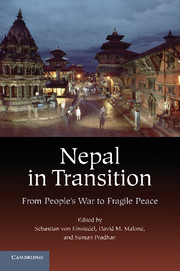Book contents
- Frontmatter
- Contents
- Contributors
- Acknowledgments
- 1 Introduction
- The Context
- Critical Transition and the Role of Outsiders
- Regional Dynamics
- 11 A Yam between Two Boulders: Nepal's Foreign Policy Caught between India and China
- 12 Bringing the Maoists down from the Hills: India's Role
- 13 A Nepali Perspective on International Involvement in Nepal
- Conclusions
- Index
- References
13 - A Nepali Perspective on International Involvement in Nepal
Published online by Cambridge University Press: 05 April 2012
- Frontmatter
- Contents
- Contributors
- Acknowledgments
- 1 Introduction
- The Context
- Critical Transition and the Role of Outsiders
- Regional Dynamics
- 11 A Yam between Two Boulders: Nepal's Foreign Policy Caught between India and China
- 12 Bringing the Maoists down from the Hills: India's Role
- 13 A Nepali Perspective on International Involvement in Nepal
- Conclusions
- Index
- References
Summary
Since the inception of the peace process in Nepal, the involvement of international actors has had both enormously constructive and fairly destructive political consequences. At key moments, the role of “outsiders” has enabled political consensus, aided the peace process, and pushed Nepal toward the process of creating a stable, democratic, and just state. Yet there have been other moments when international involvement – either intentionally or unintentionally, directly or indirectly – has led to greater political polarization and contributed to an unstable impasse.
This chapter recognizes that the international community in Nepal constitutes a heterogeneous category. Although the United Kingdom and other European donors have paid many of the bills to make the peace process viable, this chapter confines itself to assessing the political role and actions of India (the key regional actor), the United Nations Mission in Nepal (the lead international organization), China (the other neighbor), and the United States (the most powerful player globally). The chapter thereby broadly covers the period between the 12-Point Understanding signed by the Maoists and parties in November 2005 to May 2010 when the tenure of the Constituent Assembly was extended by a year.
- Type
- Chapter
- Information
- Nepal in TransitionFrom People's War to Fragile Peace, pp. 332 - 358Publisher: Cambridge University PressPrint publication year: 2012
- 4
- Cited by



